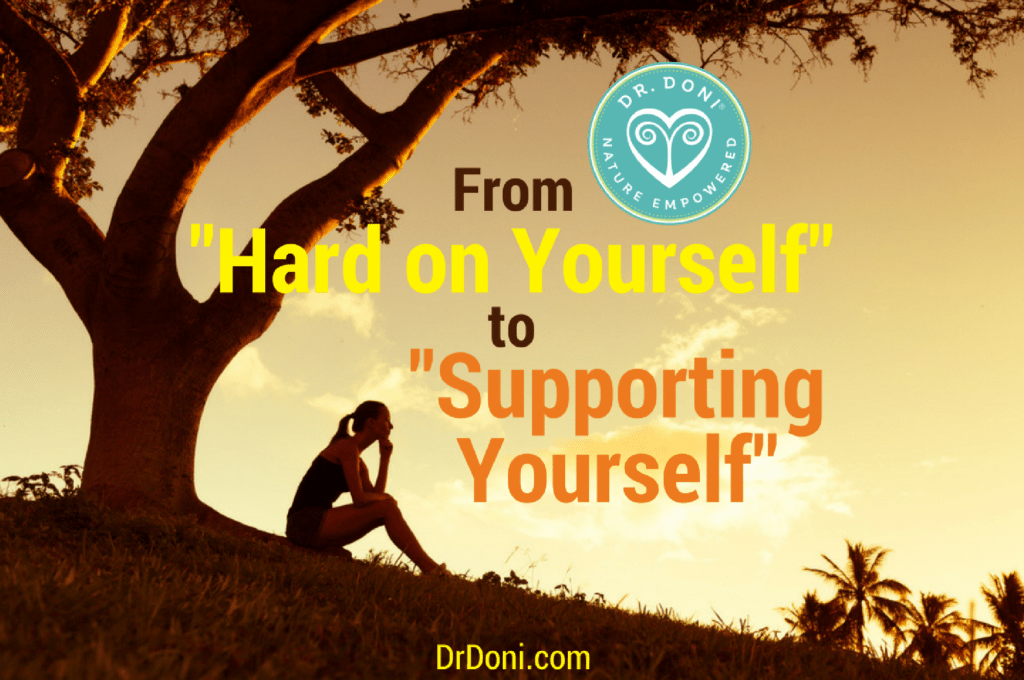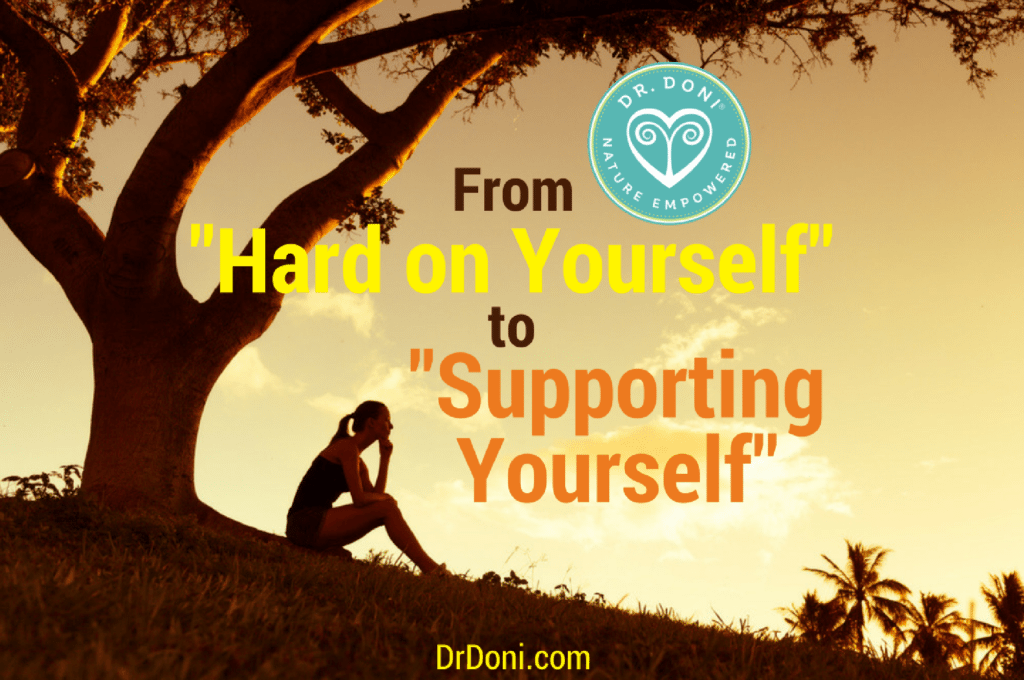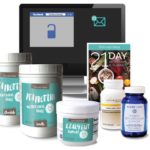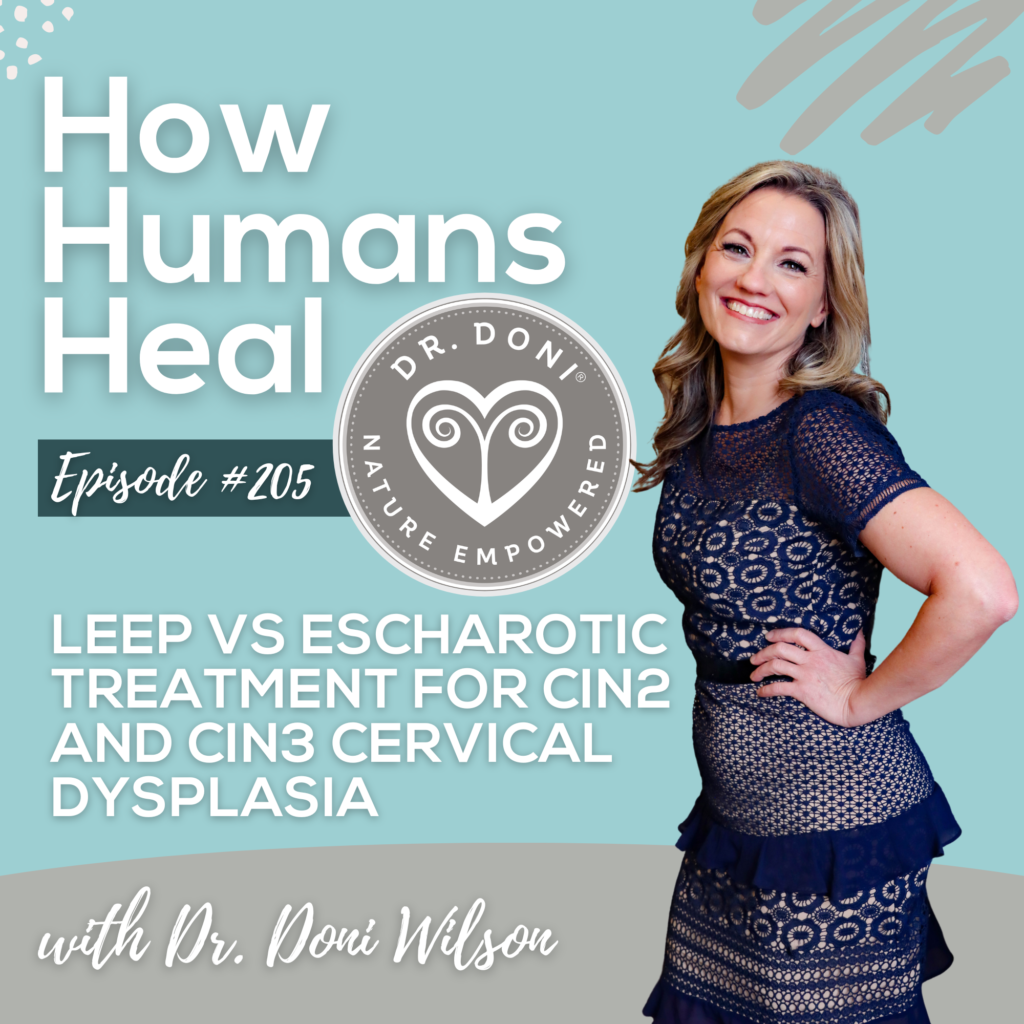
From “Hard on Yourself” to “Supporting Yourself”
- Home
- Stress & Adrenal Fatigue
- From “Hard on Yourself” to “Supporting Yourself”

Dr. Doni Wilson, N.D. offers some simple tips for making positive changes in your life – and how to break the cycle of being hard on yourself so you can start to support yourself instead.
 Making a change in your lifestyle can be challenging. We get into habits that are hard to break. For instance, when helping patients change their diet, they often tell me that they can be very “hard on themselves” when they eat something they know will make them feel worse.
Making a change in your lifestyle can be challenging. We get into habits that are hard to break. For instance, when helping patients change their diet, they often tell me that they can be very “hard on themselves” when they eat something they know will make them feel worse.
Have you experienced the “hard on yourself” vicious cycle? As you can imagine, it doesn’t do you much good.
I encourage my patients to notice the pattern… and let it go. Just like a meditation. It’s not going to go anywhere anyway, so you may as well let it go.
And once you start to let go of this negative energy, what are you going to put in its place?
Support for you! Fill the negative space with whatever will give you the support you need. It could be a bath, music, a walk outside, a snuggle with your pet, watering your plants, or some yoga.
Each of us has our own way to restore and recharge. But if you have trouble finding the right method to treat yourself, here are 7 things you can do in support of YOU to break that vicious cycle of being hard on yourself:
1. Breathe Deep!
Take a minute to inhale as deeply as you can. Hold it for a second or two, and then exhale slowly. Repeat.
And when you do, this is what happens inside of you:
- The calming part of your nervous system engages, turning off “stress mode” and turning on “rest and digest” mode.
- Oxygen goes to your body and your brain, helping you think more clearly
- You’ll get improved blood flow throughout your body
- Lymph circulation also improves
- Carbon dioxide goes out with your exhale, balancing the pH in your body
- Detoxification happens each time you exhale
- Pain decreases as you release endorphins
When we are busy and rushing from place to place, we often forget to take deep breaths. We take short “sips” of air instead. This can lead to headaches, body aches, high blood pressure, anxiety, digestive issues, and water retention.
You might be surprised at how much your body changes and how you feel when you stop to breathe throughout the day. What have you noticed?
2. Drink Water Throughout the Day!
We underestimate the power of water – it is so good for us. It’s no surprise: Our bodies are made of water and depend on it to function optimally.
You’ll know you need more water if you get any of these symptoms:
- Headaches
- Muscle cramps
- Irritability
- Blood pressure high or low
- Pain
- Constipation
- Dry or itchy skin
- Food cravings
These are all common symptoms of dehydration. Unless you’re suffering from severe dehydration, it’s easy to remedy. You can start by drinking a small amount – 4 to 6 ounces – every hour. You can add some fresh squeezed lemon for taste and to support detoxification too. Or you can add a couple grains of sea salt for electrolytes.
3. Eat Fruits & Veggies!
When you look at fruits and veggies, think “antioxidants!”
What is an antioxidant? They are nutrients that protect your cells. They protect you from toxins, stress, aging, and more. That’s why you’ll hear the advice to “eat a rainbow” of fruits and veggies, because the colors indicate that they contain antioxidants. To be fair though, even white veggies (like cauliflower and potatoes) also contain antioxidants.
You might challenge yourself to buy different fruits and veggies each time you go to the store. Variety is good! And each time you sit down to eat, ask yourself, “what colors am I eating now?”
And remember to choose organic. Otherwise you’ll be using all your antioxidants to counter the pesticides instead of benefiting your cells.
4. Connect with a Friend!
What I mean by that is – hang out with friends and loved ones regularly. And the reason is because research shows that just as alone time is important, so is connecting with others and having a sense of community.
Research shows that calling a friend or your mom (or dad), and talking about your day and your feelings can help relieve feelings of stress, decrease cortisol, and increase oxytocin, a good-for-you hormone.
Having a sense of community can also benefit your health and wellbeing, but works best when you interact in person. So if you feel you don’t have a sense of community, you might use your phone or computer to find a local group or class you’d like to join, and then set down your mobile device and head out to find others with a similar interest as you.
It can feel strange at first, especially if you haven’t reached out in a while, but I encourage you to give it a try and notice how your body feels afterwards.
5. Laugh!
I’m sure you’ve heard the phrase, “laughter is the best medicine.” It can seem too fun to be true, but laughter really is good for you!
This is what happens when you laugh:
- It reduces cortisol, our stress hormone
- It raises endorphins, the “feel good” messages in our bodies
- It increases oxytocin, another good-for-you hormone
- It relaxes your muscles, which are often tight when stressed
- It improves your mood – and the mood of others around you
- It helps your immune system work better to fight off infections
- It reduces the symptoms of asthma
- It raises testosterone in men and increases fertility for women
- It decreases depression and improves learning and memory
- It generally benefits quality of life
How to get the laughter going, you might ask? You could find a funny video online, a comedy movie to watch, or cartoons you enjoy. Call a friend who makes you laugh or tell a funny joke. We often laugh when others laugh too, so even if you’re the one making others laugh – good for you!
Laughing is one of the biggest mood enhancers – and it’s free, with no harmful side effects!
6. Listen to music!
I just love it when things that are fun are good for you too. Music is one of those things.
When you listen to your favorite tunes, your body listens too. And some good things start to happen:
- Calming – decreased stress and anxiety
- Stress reset – lowers elevated cortisol
- Relaxation – supports calming neurotransmitters
- Focus – shown to improve attention and memory
- Motivation – helps you get more out of your workout
- Creativity – allows your creative side to flow
- Celebration – experiencing emotions and events
- Connection – for memories and spending time with others
- Soothes pain – decreases muscle and joint discomfort
- Heart health – lowers blood pressure and decreases risk of heart disease
- Cheers you up – increases dopamine and improves mood
By doing all these things, music improves your health. Your digestive system works better, hormones become more balanced, your immune system protects without over-reacting, and your nervous system re-syncs. As a result, music helps you sleep better, lose extra weight more easily, and recover from infections faster.
Different types of music have different effects. Instrumental versus vocal; classical versus jazz; repetitive versus harmonious; loud versus soft. So many variations exist – what is your favorite?
One study found that listening to classical music for 25 minutes per day helped decrease back pain and improved sleep quality.
7. Exercise!
Everyone knows that exercising is good for you. But what’s surprising to some is that even small amounts each day can make a huge difference. You don’t have to push yourself to your limit in a spin class or run a marathon to realize the benefits of exercise.
Just a short walk each day can help. And what I like is that it counts as a form of mindfulness too. Exercise can be “me time,” a place to sort out your thoughts and better prioritize the day’s tasks.
Here are some of the good things that happens with moderate exercise:
- You get a boost of immune function and healthy detoxification to fight off viruses
- Increased insulin function helps manage elevated blood sugar
- Increases growth hormone to build muscles and increased energy endurance during the daytime
- It boosts your Basal Metabolic Rate so you can burn calories more efficiently – even when you are not working out
- Exercise aids in sleep quality, which is ELEMENTAL to help your body repair itself from stress
- It reduces risk of cancer, heart disease, diabetes and memory loss
- It has been shown to improve and increase libido
- And it creates community with others who exercise
Again, don’t be hard on yourself here! Start with small amounts, including core strength. Then gradually increase it based on how you feel as your adrenal glands start to recover from what’s called adrenal stress.
Do you have a favorite workout app? Please share what helps you stay on top of exercise goals.
Catching Yourself When the “Hard on Yourself” Pattern Starts
It can feel weird at first to do something different. That’s because it is not the “usual” pattern. But soon, as you engage in more supportive activities – even starting with 2 minutes each day – it will be come your norm. You’ll push out the “hard on yourself” mentality little by little as you make progress.
Go at your own pace. Give it a try and let me know what you notice!
This is what we do in the Stress Remedy Programs, by the way. Small steps each day to integrate a change in your diet, stress, sleep, and exercise routine. The programs come in a 7-Day and 21-Day version:
 The 7-Day Stress Remedy Program is a quick “reset” that helps you get back on the right path and into your normal routine, without having to commit to a long-term program.
The 7-Day Stress Remedy Program is a quick “reset” that helps you get back on the right path and into your normal routine, without having to commit to a long-term program.
 The 21-Day Stress Remedy Program is recommended if you have been experiencing stress-related symptoms for a long time.
The 21-Day Stress Remedy Program is recommended if you have been experiencing stress-related symptoms for a long time.
And if you’d like to read about Stress Remedies and how they support your health, you may want to read my 99-cent eBook or take my online stress quiz (free) here.
Sometimes the simplest changes can make a huge difference!
–Dr. Doni
18th April 2017
Share this Post:
Dr. Doni Wilson's Team
14 Day Detox Program
Take the Stress Type Quiz
Dr. Doni Social Media
Popular Posts


The 5 Burnout Types

Healing HPV Holistically: Dr. Doni on the Inspire Health by Jen Podcast

Recent Podcasts
Signup to receive our weekly newsletter with all the latest news, podcasts and special offers
New Book - Order Today!

SIMPLE PRACTICES for SHIFTING FROM YOUR STATE of STRESS to YOUR FLOW and FREEDOM
MASTER YOUR STRESS
RESET YOUR HEALTH
Order Now! Related Posts

What is making you susceptible to HPV?
I have been working with women who had abnormal cells on their cervix and/or vaginally, caused by HPV for over 20 years now. And while

The 5 Burnout Types
Did you know there are 5 burnout types? They are based on your Stress Type®, which is how your adrenal function has been affected by

Healing HPV Holistically: Dr. Doni on the Inspire Health by Jen Podcast
Dr. Doni was interviewed by Jen Ciszewski on the Inspire Health by Jen Podcast, talking about how to heal away HPV from your body for good.

Stress and Trauma: The Science Behind It, How It Shows Up and How to Heal: Dr. Doni on The Burn Fat and FEAST Podcast
Dr. Doni was interviewed by Sarah B. Thomas on the Burn Fat and FEAST Podcast, talking about the impact of stress and trauma on our health and what to do to recover from them.














